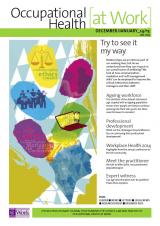December/January 2014/2015 (vol. 11/4)
ContentsFeaturesNewsLegal
NewsResearch DigestResearch PlusCPD
Research Plus
Psychological work factors increase MSD risk
Psychological work factors are predictive of upper limb and neck musculoskeletal disorders (MSDs) among female staff working in elderly care, according to this cross-sectional study of 2,328 housekeepers, nursing assistants and nurses in 105 French nursing homes. MSDs during the previous 12 months were assessed using the ‘Nordic’ questionnaire. Psychosocial exposure was estimated using the Siegrist effort–reward imbalance (ERI) questionnaire. ERI was reported by 9% and over-commitment (excessive striving and inability to withdraw from work obligations) by 42% of participants. ERI was significantly predictive (p < 0.001) of MSDs of the neck (prevalence ratio (PR) = 1.30; CI 1.16–1.45), shoulder (PR = 1.30; CI 1.13–1.48), elbow (PR = 1.69; CI 1.20–2.37) and wrist (PR = 1.49; CI 1.22–1.82). Over-commitment was predictive of MSDs in each of the four locations. The study did not distinguish between new and recurrent MSDs.
- Occupational risk factors for upper-limb and neck musculoskeletal disorder among healthcare staff in nursing homes for the elderly in France.[PDF] Industrial Health 2014; 52: 334–346.
Occupational Health at Work December/January 2014/2015 (vol. 11/4) pp39



